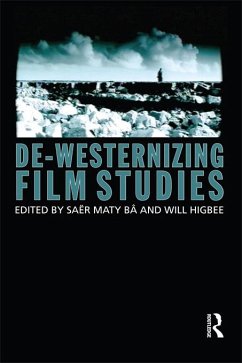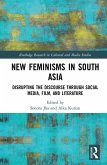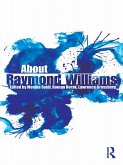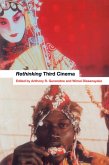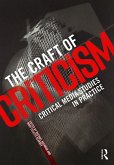De-Westernizing Film Studies (eBook, ePUB)
Redaktion: Ba, Saer Maty; Higbee, Will
40,95 €
40,95 €
inkl. MwSt.
Sofort per Download lieferbar

20 °P sammeln
40,95 €
Als Download kaufen

40,95 €
inkl. MwSt.
Sofort per Download lieferbar

20 °P sammeln
Jetzt verschenken
Alle Infos zum eBook verschenken
40,95 €
inkl. MwSt.
Sofort per Download lieferbar
Alle Infos zum eBook verschenken

20 °P sammeln
De-Westernizing Film Studies (eBook, ePUB)
Redaktion: Ba, Saer Maty; Higbee, Will
- Format: ePub
- Merkliste
- Auf die Merkliste
- Bewerten Bewerten
- Teilen
- Produkt teilen
- Produkterinnerung
- Produkterinnerung

Bitte loggen Sie sich zunächst in Ihr Kundenkonto ein oder registrieren Sie sich bei
bücher.de, um das eBook-Abo tolino select nutzen zu können.
Hier können Sie sich einloggen
Hier können Sie sich einloggen
Sie sind bereits eingeloggt. Klicken Sie auf 2. tolino select Abo, um fortzufahren.

Bitte loggen Sie sich zunächst in Ihr Kundenkonto ein oder registrieren Sie sich bei bücher.de, um das eBook-Abo tolino select nutzen zu können.
This edited collection brings together international scholars and filmmakers with research expertise across a range of non-Western film cultures, but who have one shared aim: to challenge and offer alternatives to Eurocentric theoretical, historical perspectives in film studies.
- Geräte: eReader
- mit Kopierschutz
- eBook Hilfe
- Größe: 9.56MB
Andere Kunden interessierten sich auch für
![Spectral Spaces and Hauntings (eBook, ePUB) Spectral Spaces and Hauntings (eBook, ePUB)]() Spectral Spaces and Hauntings (eBook, ePUB)42,95 €
Spectral Spaces and Hauntings (eBook, ePUB)42,95 €![New Feminisms in South Asian Social Media, Film, and Literature (eBook, ePUB) New Feminisms in South Asian Social Media, Film, and Literature (eBook, ePUB)]() New Feminisms in South Asian Social Media, Film, and Literature (eBook, ePUB)40,95 €
New Feminisms in South Asian Social Media, Film, and Literature (eBook, ePUB)40,95 €![Queer TV (eBook, ePUB) Queer TV (eBook, ePUB)]() Queer TV (eBook, ePUB)53,95 €
Queer TV (eBook, ePUB)53,95 €![About Raymond Williams (eBook, ePUB) About Raymond Williams (eBook, ePUB)]() About Raymond Williams (eBook, ePUB)45,95 €
About Raymond Williams (eBook, ePUB)45,95 €![Rethinking Third Cinema (eBook, ePUB) Rethinking Third Cinema (eBook, ePUB)]() Rethinking Third Cinema (eBook, ePUB)38,95 €
Rethinking Third Cinema (eBook, ePUB)38,95 €![British Cinema, Past and Present (eBook, ePUB) British Cinema, Past and Present (eBook, ePUB)]() British Cinema, Past and Present (eBook, ePUB)38,95 €
British Cinema, Past and Present (eBook, ePUB)38,95 €![The Craft of Criticism (eBook, ePUB) The Craft of Criticism (eBook, ePUB)]() The Craft of Criticism (eBook, ePUB)49,95 €
The Craft of Criticism (eBook, ePUB)49,95 €-
-
-
This edited collection brings together international scholars and filmmakers with research expertise across a range of non-Western film cultures, but who have one shared aim: to challenge and offer alternatives to Eurocentric theoretical, historical perspectives in film studies.
Dieser Download kann aus rechtlichen Gründen nur mit Rechnungsadresse in A, B, BG, CY, CZ, D, DK, EW, E, FIN, F, GR, HR, H, IRL, I, LT, L, LR, M, NL, PL, P, R, S, SLO, SK ausgeliefert werden.
Produktdetails
- Produktdetails
- Verlag: Taylor & Francis eBooks
- Seitenzahl: 296
- Erscheinungstermin: 10. September 2012
- Englisch
- ISBN-13: 9781136502514
- Artikelnr.: 38274387
- Verlag: Taylor & Francis eBooks
- Seitenzahl: 296
- Erscheinungstermin: 10. September 2012
- Englisch
- ISBN-13: 9781136502514
- Artikelnr.: 38274387
- Herstellerkennzeichnung Die Herstellerinformationen sind derzeit nicht verfügbar.
Saër Maty Bâ is a temporary Lecturer Film Studies at Bangor University. Prior to joining Bangor, he had held fellowships at the universities of St Andrews, East London and Porstmouth. His research blurs boundaries between diaspora, film, media, and cultural studies. His articles, and book and film reviews have appeared in the journals Film International, Transnational Cinemas, Studies in Documentary Film Senses in Cinema, and Cultural Studies Review. He is co-editor with Will Higbee of the Journal of Media Practice/Special Issue: Re-presenting diaspora in cinema and new (digital) media (2010). Bâ is an associate editor, translator, contributor and editorial board member within The Encyclopedia of Global Human Migration project (2012). Will Higbee is a Senior Lecturer in Film Studies at the University of Exeter. He is the author of Matthieu Kassovitz (2007) and the co-editor with Sarah Leahy of Studies in French Cinema: UK Perspectives 1985-2010 (2010) and with Saër Maty Bâ of a special edition of the Journal of Media Practice: 'Re-presenting Diaspora in Cinema and New (Digital) Media'. He is a member of the editorial board of the journal Studies in French Cinema and has published various articles on contemporary French cinema, cinemas of the North African diaspora in France and questions of transnational cinemas in journals such as Transnational Cinemas, French Cultural Studies and Africultures. He is currently completing a monograph entitled Post-beur cinema: Maghrebi-French and North African émigré filmmaking in France since 2000.
Foreword: Graeme Harper Introduction: De-Westernizing Film Studies Part 1:
(Dis-)continuities of the Cinematic Imaginary: (Non-)Representation,
Discourse and Theory Chapter 1: Imagi[ni]ng the Universe: Cosmos, Otherness
and Cinema Chapter 2: Questioning Discourses of diaspora: "Black" Cinema as
Symptom Chapter 3: Affective Passions: The Dancing Female Body and Colonial
Rupture in Zouzou (1934) and Karmen Geï (2001) Chapter 4: African
Frameworks of Analysis for African Film Studies Part 2: Narrating the
(Trans)Nation, Region and Community from Non-Western Perspectives Chapter
5: De-westernizing national cinema: re-imagined communities in the films of
Férid Boughedir Chapter 6: Banal Transnationalism: On Makhmalbaf's
"Borderless" Filmmaking Chapter 7: Griots and Talanoa Speak: Storytelling
as Theoretical Frames in African and Pacific Island Cinemas Chapter 8: The
Intra-East Cinema: the re-framing of an East Asian Film Sphere Part 3: New
(dis-)continuities from 'within' the West Chapter 9: "A double set of
glasses": Stanley Kubrick and the Midrashic Mode of Interpretation Chapter
10: Situated Bodies, Cinematic Orientations: Film and (Queer) Phenomenology
Chapter 11 Has film ever been Western? Continuity and the question of
building a "common" cinema Part 4: interviews Editors' note on interviews
Chapter 12: "There is No Entirely Non-Western Place Left ": De-Westernizing
the moving image, an interview with Coco Fusco Chapter 13: De-Westernizing
Film through Experimental Practice: an interview with Patti Gaal-Holmes
Chapter 14: "With Our Own Pen and Papers": an interview with Teddy E.
Mattera Chapter 15: "To Colonize a Subject Matter is to Learn Nothing from
it": an interview with Jonnie Clementi-Smith Chapter 16: "Isn't It Strange
that 'World' means Everything Outside the West?": an interview with Rod
Stoneman Chapter 17: Beyond Stereotypes and Preconceptions: an interview
with Farida Benlyazid Chapter 18: "About Structure, Not about Individual
Instances": an interview with Daniel Lindvall Chapter 19: "Still Waiting
for a Reciprocal De-Westernization": an interview with Mohammed Bakrim
Chapter 20: "Moving Away from a Sense of Cultures as Pure Spaces ": an
interview with Deborah Shaw Chapter 21: Nu Third Queer Cinema: an interview
with Campbell X Chapter 22: "To Start with a Blank Slate of Free Choices":
an interview with Kuljit Bhamra Chapter 23: "The Crazy Dream of living
without the Other": an interview with Olivier Barlet Chapter 24:
"De-Westernizing as Double Move": an interview with John Akomfrah
(Dis-)continuities of the Cinematic Imaginary: (Non-)Representation,
Discourse and Theory Chapter 1: Imagi[ni]ng the Universe: Cosmos, Otherness
and Cinema Chapter 2: Questioning Discourses of diaspora: "Black" Cinema as
Symptom Chapter 3: Affective Passions: The Dancing Female Body and Colonial
Rupture in Zouzou (1934) and Karmen Geï (2001) Chapter 4: African
Frameworks of Analysis for African Film Studies Part 2: Narrating the
(Trans)Nation, Region and Community from Non-Western Perspectives Chapter
5: De-westernizing national cinema: re-imagined communities in the films of
Férid Boughedir Chapter 6: Banal Transnationalism: On Makhmalbaf's
"Borderless" Filmmaking Chapter 7: Griots and Talanoa Speak: Storytelling
as Theoretical Frames in African and Pacific Island Cinemas Chapter 8: The
Intra-East Cinema: the re-framing of an East Asian Film Sphere Part 3: New
(dis-)continuities from 'within' the West Chapter 9: "A double set of
glasses": Stanley Kubrick and the Midrashic Mode of Interpretation Chapter
10: Situated Bodies, Cinematic Orientations: Film and (Queer) Phenomenology
Chapter 11 Has film ever been Western? Continuity and the question of
building a "common" cinema Part 4: interviews Editors' note on interviews
Chapter 12: "There is No Entirely Non-Western Place Left ": De-Westernizing
the moving image, an interview with Coco Fusco Chapter 13: De-Westernizing
Film through Experimental Practice: an interview with Patti Gaal-Holmes
Chapter 14: "With Our Own Pen and Papers": an interview with Teddy E.
Mattera Chapter 15: "To Colonize a Subject Matter is to Learn Nothing from
it": an interview with Jonnie Clementi-Smith Chapter 16: "Isn't It Strange
that 'World' means Everything Outside the West?": an interview with Rod
Stoneman Chapter 17: Beyond Stereotypes and Preconceptions: an interview
with Farida Benlyazid Chapter 18: "About Structure, Not about Individual
Instances": an interview with Daniel Lindvall Chapter 19: "Still Waiting
for a Reciprocal De-Westernization": an interview with Mohammed Bakrim
Chapter 20: "Moving Away from a Sense of Cultures as Pure Spaces ": an
interview with Deborah Shaw Chapter 21: Nu Third Queer Cinema: an interview
with Campbell X Chapter 22: "To Start with a Blank Slate of Free Choices":
an interview with Kuljit Bhamra Chapter 23: "The Crazy Dream of living
without the Other": an interview with Olivier Barlet Chapter 24:
"De-Westernizing as Double Move": an interview with John Akomfrah
Foreword: Graeme Harper Introduction: De-Westernizing Film Studies Part 1:
(Dis-)continuities of the Cinematic Imaginary: (Non-)Representation,
Discourse and Theory Chapter 1: Imagi[ni]ng the Universe: Cosmos, Otherness
and Cinema Chapter 2: Questioning Discourses of diaspora: "Black" Cinema as
Symptom Chapter 3: Affective Passions: The Dancing Female Body and Colonial
Rupture in Zouzou (1934) and Karmen Geï (2001) Chapter 4: African
Frameworks of Analysis for African Film Studies Part 2: Narrating the
(Trans)Nation, Region and Community from Non-Western Perspectives Chapter
5: De-westernizing national cinema: re-imagined communities in the films of
Férid Boughedir Chapter 6: Banal Transnationalism: On Makhmalbaf's
"Borderless" Filmmaking Chapter 7: Griots and Talanoa Speak: Storytelling
as Theoretical Frames in African and Pacific Island Cinemas Chapter 8: The
Intra-East Cinema: the re-framing of an East Asian Film Sphere Part 3: New
(dis-)continuities from 'within' the West Chapter 9: "A double set of
glasses": Stanley Kubrick and the Midrashic Mode of Interpretation Chapter
10: Situated Bodies, Cinematic Orientations: Film and (Queer) Phenomenology
Chapter 11 Has film ever been Western? Continuity and the question of
building a "common" cinema Part 4: interviews Editors' note on interviews
Chapter 12: "There is No Entirely Non-Western Place Left ": De-Westernizing
the moving image, an interview with Coco Fusco Chapter 13: De-Westernizing
Film through Experimental Practice: an interview with Patti Gaal-Holmes
Chapter 14: "With Our Own Pen and Papers": an interview with Teddy E.
Mattera Chapter 15: "To Colonize a Subject Matter is to Learn Nothing from
it": an interview with Jonnie Clementi-Smith Chapter 16: "Isn't It Strange
that 'World' means Everything Outside the West?": an interview with Rod
Stoneman Chapter 17: Beyond Stereotypes and Preconceptions: an interview
with Farida Benlyazid Chapter 18: "About Structure, Not about Individual
Instances": an interview with Daniel Lindvall Chapter 19: "Still Waiting
for a Reciprocal De-Westernization": an interview with Mohammed Bakrim
Chapter 20: "Moving Away from a Sense of Cultures as Pure Spaces ": an
interview with Deborah Shaw Chapter 21: Nu Third Queer Cinema: an interview
with Campbell X Chapter 22: "To Start with a Blank Slate of Free Choices":
an interview with Kuljit Bhamra Chapter 23: "The Crazy Dream of living
without the Other": an interview with Olivier Barlet Chapter 24:
"De-Westernizing as Double Move": an interview with John Akomfrah
(Dis-)continuities of the Cinematic Imaginary: (Non-)Representation,
Discourse and Theory Chapter 1: Imagi[ni]ng the Universe: Cosmos, Otherness
and Cinema Chapter 2: Questioning Discourses of diaspora: "Black" Cinema as
Symptom Chapter 3: Affective Passions: The Dancing Female Body and Colonial
Rupture in Zouzou (1934) and Karmen Geï (2001) Chapter 4: African
Frameworks of Analysis for African Film Studies Part 2: Narrating the
(Trans)Nation, Region and Community from Non-Western Perspectives Chapter
5: De-westernizing national cinema: re-imagined communities in the films of
Férid Boughedir Chapter 6: Banal Transnationalism: On Makhmalbaf's
"Borderless" Filmmaking Chapter 7: Griots and Talanoa Speak: Storytelling
as Theoretical Frames in African and Pacific Island Cinemas Chapter 8: The
Intra-East Cinema: the re-framing of an East Asian Film Sphere Part 3: New
(dis-)continuities from 'within' the West Chapter 9: "A double set of
glasses": Stanley Kubrick and the Midrashic Mode of Interpretation Chapter
10: Situated Bodies, Cinematic Orientations: Film and (Queer) Phenomenology
Chapter 11 Has film ever been Western? Continuity and the question of
building a "common" cinema Part 4: interviews Editors' note on interviews
Chapter 12: "There is No Entirely Non-Western Place Left ": De-Westernizing
the moving image, an interview with Coco Fusco Chapter 13: De-Westernizing
Film through Experimental Practice: an interview with Patti Gaal-Holmes
Chapter 14: "With Our Own Pen and Papers": an interview with Teddy E.
Mattera Chapter 15: "To Colonize a Subject Matter is to Learn Nothing from
it": an interview with Jonnie Clementi-Smith Chapter 16: "Isn't It Strange
that 'World' means Everything Outside the West?": an interview with Rod
Stoneman Chapter 17: Beyond Stereotypes and Preconceptions: an interview
with Farida Benlyazid Chapter 18: "About Structure, Not about Individual
Instances": an interview with Daniel Lindvall Chapter 19: "Still Waiting
for a Reciprocal De-Westernization": an interview with Mohammed Bakrim
Chapter 20: "Moving Away from a Sense of Cultures as Pure Spaces ": an
interview with Deborah Shaw Chapter 21: Nu Third Queer Cinema: an interview
with Campbell X Chapter 22: "To Start with a Blank Slate of Free Choices":
an interview with Kuljit Bhamra Chapter 23: "The Crazy Dream of living
without the Other": an interview with Olivier Barlet Chapter 24:
"De-Westernizing as Double Move": an interview with John Akomfrah
